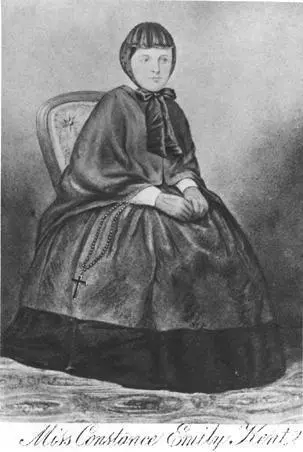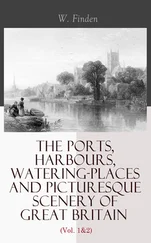Some said that Wagner had encouraged Constance to confess because he wanted to publicise his views about the sanctity of the confessional. Some suspected that his High Church fervour had stirred the girl into a false confession. James Redding Ware reprinted his pamphlet of 1862, in which he had implied that a somnambulant Elizabeth Gough had committed the crime, with 'further remarks' that cast doubt on Constance's admission of guilt. He argued that the 'Romanish' Church cultivated the idea of self-sacrifice: 'If Miss Constance Kent's confession shows one "style" more than other, it is that of emphatically gathering to herself all the odium attached to the death of her brother.'
A Wiltshire rector who visited Constance in prison in May tried to ascertain the state of her soul. When he entered her cell he found her writing at a table strewn with open books. She was 'very plain and stout', he told the Salisbury and Winchester Journal , 'and her cheeks very full'. Her manner was 'perfectly self-possessed, hard and cold'. He asked her if she believed that God had forgiven her. She answered: 'I do not feel sure that my sin is forgiven, for no one on this side of the grave can feel sure of that.' She showed no self-pity, he said, nor any regret.
From her cell Constance wrote to her solicitor, Rodway:
It has been stated that my feelings of revenge were excited in consequence of cruel treatment. This is entirely false. I have received the greatest kindness from both the persons accused of subjecting me to it. I have never had any ill will towards either of them on account of their behaviour to me, which has been very kind. I shall feel obliged if you will make use of this statement in order that the public may be undeceived on this point.
This seemed straightforward enough, but it left the matter of Constance's motive more mysterious than ever. The newspapers continued to hope that she was crazy. If mad, she could be excused, pitied, accommodated. 'The insane theory is the one that resolves all difficulties,' observed the Saturday Review on 20 May.
Women accused of murder often pleaded insanity in the hope that the courts would treat them with leniency, and it would have been easy for Constance or her representatives to argue that she had been afflicted by homicidal monomania when she killed her brother.* Her apparent sanity was no bar to such a plea - as Mary Braddon wrote in Lady Audley's Secret, 'remember how many minds must tremble upon the narrow boundary between reason
and unreason, mad to-day and sane to-morrow, mad yesterday and sane to-day'. Inherited insanity, argued the alienist James Prichard, could lie dormant until startled into life by circumstances, and could as quickly subside. Women were thought to be prone to insanity, whether as a result of suppressed menstruation, a surplus of sexual energy, or the upheavals of puberty. In an article of 1860 the physician James Crichton-Browne argued that monomania was most common in childhood. 'Impressions, created by the ever fertile imagination of a child . . . are soon believed in as realities, and become a part of the child's psychical existence. They become, in fact, actual delusions.' Children, he wrote elsewhere, were 'diamond editions of remote ancestors, full of savage whims and impulses'. Many doctors emphasised the madness, disorder, even devilishness that could flourish in young breasts - not all Victorians were set on sweetening or sanctifying the figure of the child.
Yet when the eminent alienist Charles Bucknill examined Constance in gaol, she insisted that she was sane, then and now. The doctor interrogated her about her motive for killing Saville, asking why she had not attacked the real object of her anger, her stepmother. Constance replied that this would have been 'too short'. Bucknill understood her to mean that by killing Saville she intended to inflict a prolonged torture on the woman she hated, rather than a quick extinction. Later, Bucknill told the Home Secretary that he thought Constance 'had inherited a strong tendency to insanity', but that she had 'refused to let him' state his belief in public, because she wished to protect the interests of her father and brother. Rodway explained Constance's rationale in similar terms: 'A plea of insanity at the time of the deed might, it is believed, have been set up with success,' he told the Home Secretary, 'but she, fearing that such a plea might affect prejudicially her brother's chances in life, earnestly entreated that it should not be urged on her behalf.' She was determined to protect William from the taint of madness.
After meeting Constance, Bucknill fell in with her wishes and declared her sane, but he gave the newspapers a hint of his unease. Like Whicher, he found the clue to Constance's disturbance in her stillness. The sensationalism of the murder sat strangely with the blankness of the girl. 'The only peculiarity which at all struck Bucknill,' reported the Salisbury and Winchester Journal , 'was her extreme calmness - the utter absence of any symptom of emotion.'

CHAPTER SEVENTEEN
MY LOVE TURNED
July-August 1865
On the evening of Tuesday, 18 July Constance was transferred to the county gaol at Salisbury. Usually prisoners were moved between towns by train, but the governor of Devizes prison took Constance by post-chaise across Salisbury Plain, a journey of forty miles. She joined about forty-five men and five women at Fisherton gaol, on the outskirts of the city. That Wednesday - two days before the trial - Rowland Rodway visited her to tell her that her lawyers believed that, despite her confession, she would be acquitted if she pleaded not guilty. He urged her to make her peace with God in private: her spiritual atonement, he argued, did not depend on a public confession and conviction. Constance reiterated her intention to plead guilty; it was 'her plain duty', she told the lawyer, 'the only course which would satisfy her conscience', and the only one that would lift suspicion from others.
Salisbury was filling with visitors. Samuel, Mary, Mary Ann and William Kent had rooms at the White Hart, a handsome Georgian hotel opposite the cathedral. Williamson was in town, as was Whicher, who may have stayed with his niece Mary Ann and her husband, William Wort, at their house in New Street. More than thirty witnesses for the prosecution were on hand in case they were required. These included Constance's schoolfriend Louisa, though Emma Moody had fallen ill and was unable to make the journey from Ireland.
John Duke Coleridge QC, one of the most successful barristers of his generation, had been appointed to represent Constance. On Thursday he met Mary Ann and William Kent to discuss their sister's case, 'and then', he wrote in his diary, 'sat up till near three, getting up my speech'. He composed a letter to his client: 'If you plead Not Guilty then whatever I can do shall be done for your acquittal. If you plead Guilty anything I can say to set others right shall be said. But I advise you against any intermediate course.' Constance replied early in the morning of Friday, 21 July, the day of the trial: 'I am persuaded that nothing will tend to clear the innocent so completely as my conviction.'
The Wiltshire constabulary had erected barriers outside the courthouse and drafted in constables from all over the county. About thirty reporters had turned up, and they were furious to discover that no provision had been made for them - the city authorities had failed to build the press balcony they had promised. Only fourteen places were allocated to the reporters; the others had to take their chances with the rest of the mob when the doors were opened at nine.
Читать дальше













